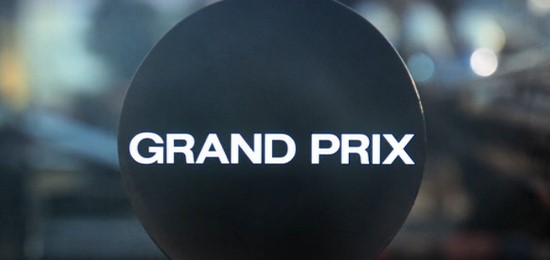
How modern was the world in 1966? I wasn’t alive and have no personal frame of reference. But when I look at a lot of the major cultural moments of the 60’s that continue to resonate in my life, they seem to have come in the second half of the decade. For me, the advent of counter-culture, the psychedelic drug scene, increasing American involvement in Viet Nam and the assination of Martin Luther King, Jr. mark a shift, a realization of just how imperfect post- WWII USA was. That move toward self-awareness is such a vital step in the post-modern moment of my mid-90’s education. The self-referential nature of ‘Pulp Fiction’ (and all the work and commentary that goes with critical theory) would never have been possible without Chicago ’68 and Wodstock and 2001: A Space Odyssey – The Ultimate Trip.
So what was life like before that realization started to set in? What did the world look like to an American filmmaker who, in 1965, didn’t understand that it was possible for the United States of America to lose a war?
I think the answer is: Modern.
The assassination of President Kennedy only served to bring the country closer together in its anxiety. There was no nuclear holocaust after that tragedy, and no rioting in the streets (at least none that was directly related to the transfer of political power). But more inportant than what did not happen, is what did happen – Americans (and Russians) continued to explore space.
And while the superpowers were making every effort to scare each other (and eveyone else on the planet) to death, there was a higher faith that man could master technology to conquer the stars. Despite our fears, we were living in an age of wonder.
Against this backdrop come two extraordinary movies by John Frankenheimer, both released in 1966. In October Paramount released ‘Seconds‘ – a psychedelic, horror drama about being trapped in the wrong body. Rock Hudson provides the performance of a lifetime, but Frankenheimer’s use of distorted sets and perverse camera angles brings a strong measure of the avant-garde to James Wong Howe’s staggering cinematography. The movie is disturbing and claustrophobic as Hudson tears himself apart. It is one of my favorite films of all time, and stands tall with the major works of Kubrick, Scorsese and Pekinpah, despite their more rebellious reputations.
And then in December of 1966, MGM brings us Grand Prix. For years, I have read that this is the best racing movie of all time. I am not a fan of racing, I am a fan of Formula 1 racing. I don’t give a fig about Nascar, or CART, or Indy Car, or Outlaw, or Top Fuel, or soapbox racers. I like Le Mans cars, but there is no coherent league or championship, so there is nothing to follow through a ‘season’ as there is in F1.
And this film, by one of my favorite director’s is about F1. So what was the problem? Two words: James Garner. Now, that’s not really fair, because I have nothing against James Garner. I was never a Rockford fan, and I don’t know anything about Maverick. The real problem that I had with James Garner was that he was not Steve McQueen or Paul Newman. How is it possible that the greatest racing movie of all time could be made in 1965 and not star one of those masters? My feeling was that if at least one of them was NOT the star, then the movie could not be any good.
Now that I have finally watched Grand Prix, I can not begin to tell you how wrong I was.
James Garner is not the star of this movie. Formula 1 racing is the star of this movie. The love and care with which the sport is depicted is unparalleled. As with any specific enthusiasm, there are those who ‘get it’ and those who do not. Frankenheimer got it. He makes love to the courses with his cameras. He invented a whole new way to film cars in motion. No one had put cameras on cars before and shot them around real race tracks at full speed. That may be the norm in racing coverage now, but this is where it started. No one had absolutely required all his cast to learn to drive and get out there on the track with the professionals and DO IT. And, to Garner’s credit, he is reported as having loved it and excelled in race craft. Apparently, professional drivers felt he could have had a proper racing career if he had started earlier – that high praise from immortals like Jack Brabham, Phil Hill and others.
Plot? Did someone mention plot? Well, it’s clearly not the primary concern, but it’s not altogether disastrous either. The drivers live on the edge of fear and heroism, needing always to go faster to find some meaning in life. The women are thinly drawn foils that help underline the absurdity of the sport, as well as it’s pure passion and beauty and grace.
But all of that is secondary to the most beautifully documented visual description of motor racing in the 60’s. Frankenheimer had cooperation from the racers and teams and spent countless reels documenting actual races at Monte Carlo, Spa and Monza. Those three sequences are nothing short of phenomenal. He seamlessly wove the actual race footage (at 160+ mph) with the carefully choregraphed elements of his racing story so that there is no need to suspend disbelief. It’s that good.
But I don’t think it needs to be limited to just racing fans, any more than 2001: A Space Odyssey needs to be limited to sci-fi fans. The comparison with that movie is apt because of the extraordinary technological feat that the completed feature represents. Both filmmakers achieved a look and feel that had never been seen before. The fact that Frankenheimer’s work occurs in an earlier context is a testament to his foresight and genius. The opening sequence of Grand Prix recalls the film Woodstock, with it’s use of split and multi-screen presentation. That effect, seen today, makes Frenkenheimer appear quite prescient.
Formula 1, especially now, is so much about the machines. Grand Prix’s scenes of drivers arguing with mechanics could be taken directly from the paddock of any era. A great driver in an inferior machine would never win. But a poor driver in a fast car would also have no chance. Only when it all comes together, that magical interface of man and machine, can there be any hope for success. But that is not enough. Grand Prix shows us men pushing the envelopes, going ten tenths and beyond. Only a few can do that and survive, but for those who live, immortal glory awaits.
With the roar of engines and the breakneck speeds of cameras on cars and helicopters, Frankeheimer went out to the limit and beyond. This movie, shot in brilliant cinemascope and supported by Maurice Jarre’s ebullient score, brings the glory to you and takes your breath away.



